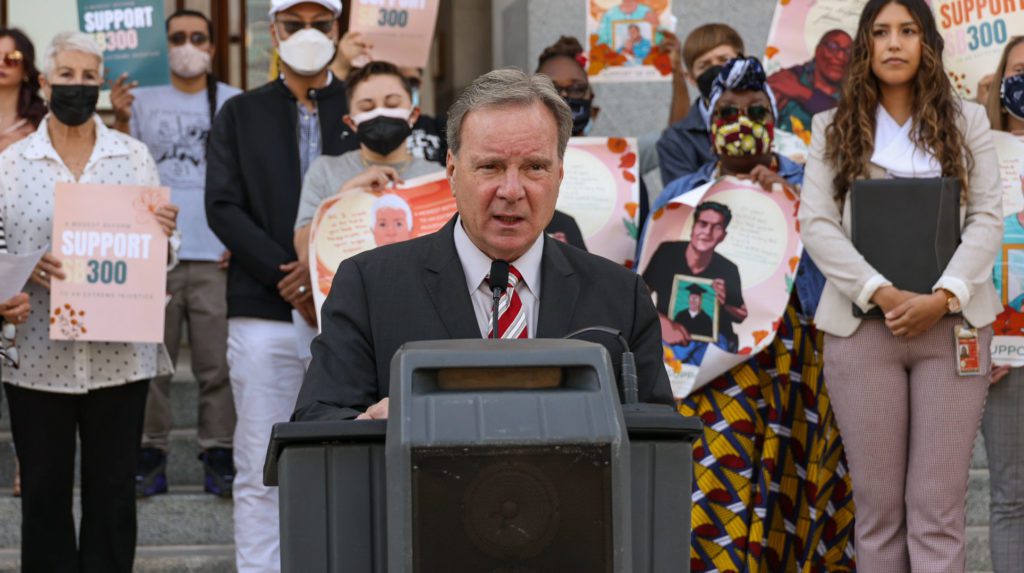Santa Clara County representatives are seeing their work turn into reality following Gov. Gavin Newsom’s signing of a flurry of bills at the end of September.
These new laws stem from both the state Senate and Assembly, and deal with addressing housing displacement, more stringent screening of potential police officers and helping small businesses upgrade facilities for disability access.
Here are some of the laws authored and championed by local elected officials.

State Sen. Dave Cortese
State Sen. Dave Cortese authored 12 bills that became law this year. Two of the bills, SB 649 and SB 707, address housing displacement among vulnerable populations, including communities of color and seniors.
“There’s been this ongoing concern about displacement and gentrification,” Cortese told San José Spotlight. “The housing crisis is one of the top three crises that we face in the state of California.”
SB 649 grants developers access to state funds and tax subsidies if they prioritize local residents in new projects. The law ensures those in communities of color are not displaced and have access to newly constructed affordable housing, Cortese said.
The other law, SB 707, will prevent senior residents from being booted out of assisted living and care facilities, requiring the state to step in if the facilities face bankruptcy or other financial problems. The law encourages public transparency by ensuring financial reports are available to the state and residents to prevent or prepare for unexpected closures, Cortese said.
“Continuing care facilities are a big industry. If you’ve had your loved one there, and suddenly there’s a financial default by the continuing care facility, you find out with little to no time to do anything,” Cortese told San José Spotlight. “Getting these financial statements from them directly means the state can step in and provide the safety net necessary to make sure that those residents are not out on the street.”
Two other approved bills authored by Cortese include SB 1294, which implements mental health services for transit workers in light of last year’s VTA mass shooting, and SB 1100, which addresses increasing hostility and disruptions in public meetings.
Assemblymember Ash Kalra
Assemblymember Ash Kalra authored 14 bills signed by Newsom. AB 256 and AB 655 reform the criminal justice system by better screening law enforcement candidates and addressing potential racial bias in previous convictions, while AB 2300 protects benefits and state aid for workers.
AB 655, signed Friday, addresses political extremism in law enforcement agencies and requires candidates to pass a screening for involvement with hate groups. The bill was born out of San Jose following numerous police officers caught making racist posts on social media.
“In order for law enforcement to be effective, they must have the trust of the community,” Kalra told San José Spotlight. “When you have individuals that carry the badge and the responsibilities that come with it, that harbor these relationships with extremist groups, it really whittles down (that) trust.”
AB 256 allows defendants with convictions before 2021 to appeal their case if racial bias is proven. The bill is the successor to AB 2542, authored by Kalra in 2020, which allows defendants with racially-motivated convictions after 2021 to appeal. The 2020 law also prohibited the state from further sentencing individuals based on race, ethnicity or national origin.
Getting AB 256 to the governor’s desk was a yearslong task, Kalra said, but the legislation will be a tool for defendants and attorneys in coming years.
AB 2300 will enable employees enrolled in CalFresh and CalWORKS to remain eligible for benefits including financial aid and food assistance, even if they quit their job or reduce their hours as a result of hostile work environments.
“Whether it’s folks working for a tech company or fast-food restaurants, we want to make sure they’re not in any way disincentivized for standing up for themselves,” Kalra told San José Spotlight. “Especially in an area like ours where the cost of living is so high, workers cannot afford to be stranded.”
Kalra secured $10 million in funding for road infrastructure improvements in East San Jose in August. He also authored AB 2278, approved last month, which requires annual reports on the goal of conserving at least 30% of California’s lands and coastal waters by 2030.

Assemblymember Alex Lee
Assemblymember Alex Lee helped pass 10 bills over the past year. AB 2164 assists small businesses through state and local funding to upgrade properties to improve disability access. The law was a result of hundreds of Santa Clara County businesses facing lawsuits and having to shut down due to a lack of funds to make required improvements.
“Our district has cities with some of the highest number of ADA lawsuits in the state, and it can be difficult for small business owners to become compliant,” Lee told San José Spotlight. “Having resources accessible to these small businesses will hopefully be a lifted burden, especially for these businesses that have already endured so much during the pandemic.”
AB 1981 and 2949 both highlighted transit by rewarding jurors who use public transit and exempting veterans from paying bridge tolls, respectively.
AB 1981 will reimburse jurors who take public transit. The law also pilots a program to increase daily rates for jurors in an effort to increase juror diversity. AB 2949 exempts veterans from paying bridge tolls through a specialized, registered license plate.
Lee secured $32 million for infrastructure projects in his district earlier this month. Additionally, he authored AB 2031, which allows mobile home residents to attend meetings with a legal representative, advocate or interpreter present when speaking with park management. The county’s mobile home parks are dwindling and residents have been calling for better communication to protect one of the region’s last affordable housing options.
Contact Loan-Anh Pham at [email protected] or follow @theLoanAnhLede on Twitter.



Leave a Reply
You must be logged in to post a comment.